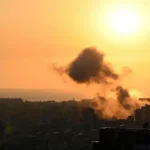|
Hello from London,
Wars have turning-points. The death of Hassan Nasrallah (read our profile of him), killed in Beirut by an Israeli strike on September 27th, is one. Hizbullah, the powerful Shia militia that he led for more than 30 years, is taking blow after devastating blow from Israeli attacks across Lebanon. Several other leading figures in the group have been killed in the past week—as well as probably hundreds of civilians. The militia is in such disarray that it is too early to speculate how it might retaliate. But responses will come. These will reshape both Lebanon (from where we report today on the reaction of ordinary Beirutis) and the wider region.
I’m focused on Iran. Hizbullah’s strength is drawn, mostly, from its role as a proxy for the regime in Tehran. The more that Israel batters the militia—having spent the past year fighting Hamas, another Iranian proxy, in Gaza—the more pressure there will be on Iran to strike back. Iran’s own leaders must be watching with consternation. Might they judge that this is the moment to escalate, to build up more deterrence, say by moving to develop full nuclear military weapons?
Another war, meanwhile, may also be reaching a turning-point. Our editor-in-chief, Zanny Minton Beddoes, has just returned from a remarkable trip with colleagues to Ukraine. The war is going badly. Listen to her podcast, in which she describes life for soldiers on the front lines and analyses the ways, militarily, economically and diplomatically, that Ukraine is on the defensive. We have argued in our most recent cover package that it is time for Ukraine and its Western allies to change course. This means setting more credible war aims, but also seeking a path for the new Ukraine to join NATO.
Time could be short. I’ve just been in Pennsylvania, which could be the decisive state in the looming presidential election. Donald Trump has promised to end the war quickly if he is elected (our forecast model and poll tracker suggest that Kamala Harris has the narrowest of leads). That can only mean that he’d provide much less support to Ukraine and would be less willing to confront Vladimir Putin.
Look out this week for the next televised debate, this time between the running-mates. I doubt any votes will switch as a result of the sparring between J.D. Vance and Tim Walz on Tuesday. But it’s an opportunity to get a look at whoever will become the next vice-president.
It’s been a busy year for elections all over the world. Today was Austrians’ turn to vote. Projections say the hard-right Freedom Party of Austria has come top. Its centre-right rival could join it in coalition—but its leader has vowed not to govern with the FPÖ’s chief. A government without the FPÖ looks likelier.
For more modest distractions (and a bit of fun) our pint-sized news quiz is ready for you to play, as is our history quiz, Dateline, where you can challenge yourself on when “Titanic” steamed into the cinemas and when the battle of Little Big Horn was fought.
And now to our caption competition. The image I’ve chosen is a photo that we used to illustrate a story in 2022, when Eric Adams became mayor of New York. He looked set to be a lively leader for the city. He’s certainly been that. On Friday he was charged with various counts of corruption, a first for a sitting mayor of New York City. (He denies the charges.) What caption would you suggest that we’d use today? Write to me at economisttoday@economist.com.
|





